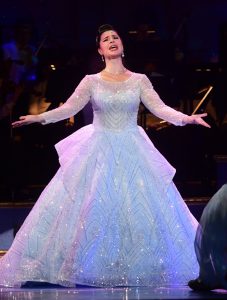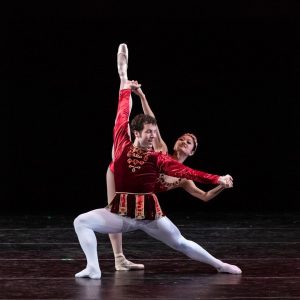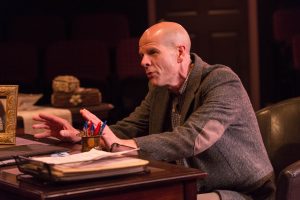Continuing my mission to spotlight performing artists during the unprecedented COVID-19 crisis, I reached out by email to four well-known performers to inquire as to how they are dealing with the pandemic. Representing different disciplines, they include violinist Zach De Pue, soprano Donata Cucinotta, veteran Indiana Repertory Theatre actor Rob Johansen, and Indianapolis Ballet principal dancer Chris Lingner.
How has the crisis impacted on you professionally?

Donato Cucinotta – Courtesy of Tom Russo. Used with permission.
Cucinotta: All of my professional contracts have been canceled until October, starting with “Don Giovanni” at Indianapolis Opera.
De Pue: Like we all now know, all concerts and gatherings have been canceled. So, I’ve had all concerts canceled through the end of May at this point with concern there’s more to come in June and beyond. It’s lost income and honestly, things are tight.
Johansen: “Murder on the Orient Express” closed with seven weeks left on our contract, costing each actor around $7,000. Two of my summer gigs have already been canceled. And two are in limbo. I do have a full plate next year, but only if we are able to be in theatres and classrooms again. If not, I’ve got nothing.
Lingner: As a dancer, this has greatly impacted not only me, but every artist in live performance. By definition, we cannot do our job as it depends on special public gatherings in theatres. It’s also really difficult to practice our craft, as we need space and special flooring to train at the level we are accustomed to. I must say on one hand, it is both inspiring and amusing to see my peers finding ways to continue to train…in our kitchens or living rooms, dodging chairs, pets, and ceiling fans. But we must dance and will always find a way to do so.
How has the crisis impacted on you personally?
Cucinotta: I am married to a health care worker. I’ve always known he was amazing, but it wasn’t until this crisis that I realized I was married to a hero.
De Pue: Well, I spent the better part of two weeks in NYC back in February with two full days hanging out in the initial epicenter there of New Rochelle. Although I have shown no symptoms, I’m incredibly scared to go home to my parents, who are well into their 80s and certainly couldn’t afford being infected with this thing. So, it just sucks not being able to be with family while this goes on.
Johansen: I am taking stock in what I have control over. I don’t have my head buried in the sand. I get updates on the virus, but I try not to dwell on it. This is a great opportunity to live in the moment and let go of worrying about the future.
Lingner: Personally, this crisis has impacted me in such a way that I worry about the future of performing arts in the short term. This hit right in the middle of audition season, so many dancers and companies had to cancel shows, revenue has been lost, and donors have lost jobs too. While I believe the arts will always exist, I worry that it may not be the same and will have to scale back by no fault of the organizations.
Are you experiencing any sort of grief?

Zach De Pue – Courtesy of Esther Boston. Used with permission.
Cucinotta: We were in the middle of rehearsals for “Don Giovanni” at Indianapolis Opera when this crisis started. The cast sounded amazing. My best friend Kirsten Chambers was singing Donna Anna and her husband Keith Chambers was conducting. Everyone in the cast was friendly and phenomenally talented. It was looking to be one of the most dynamic performances of my entire career. I gave myself a full week to grieve for the show.
De Pue: Being alone without the ability to interact with people is demoralizing. I have always enjoyed interacting with all walks of life in our Indianapolis community and that has just been shut down.
Johansen: Every time there is a social adjustment, I am trying to deal with it calmly. I honestly freaked out when IRT closed and mourned the hell out of it in the moment. Now, I am focusing on today.
Lingner: I wouldn’t say that I am grieving, though I do worry about my younger peers a great deal. I was fortunate enough to be in a position where I had a feeling this was coming and slowly took some time to prepare for a lockdown. For many people, this came out of nowhere and that can be very unsettling. I do my best to check in on people and try to help any way I can. I see times like this as a moment to “step up” rather than despair.
How are you spending your time?
Cucinotta: I have been spending my time with my family, my husband and my three-year-old son. I’ve been focusing on being there for my family and trying to keep my son’s life as interesting and fun as possible during this disruption. Without childcare, I am limited to practicing while my son naps, which I am so grateful he still does! This is also the time when I record performances for my Facebook, Instagram and YouTube pages. I’ve been Skyping with my voice teacher for almost ten years, so I’m still taking lessons as well as teaching lessons online myself. So, in some ways, my life doesn’t really look that different from any other downtime between shows. I’m still practicing, teaching my students near and far, taking care of my son and spending time with my husband when he gets done with a shift at the hospital.
DePue: Generally, cooking a lot more for myself. I do have a good solid regimen of practice going to keep in shape. I’ve also been going out and building my running back up, which has waned over the last few years after leaving the ISO.
Johansen: I am lucky that my other passion, the animal shelter, is considered essential to stay open. I am one of a handful of volunteers allowed to work there, because I work with pups that aren’t ready for adoption. I am there five or six days a week. We wear gloves, have little or no interaction with the public and we clean everything we can. I am deeply grateful for having this important purpose intact during this time of crisis.

L-R Chris Lingner & Yoshiko Kamikusa – Courtesy of Moonbug Photography. Used with permission.
Lingner: I have been spending time using some of my other skills to keep busy. I have a videography business of my own and have been doing a lot of editing for different organizations such as Dance Kaleidoscope, Gregory Hancock Dance Theatre, Indianapolis Ballet, and Rahal Letterman Lanigan Racing. I also produced and directed a livestream of Sunday mass for Holy Rosary Parish that had reach across the country as one of the few Catholic parishes that offers mass in Latin. As I’ve said before, I see this as time to “step up.”
Have you performed or conducted classes online?
Cucinotta: Yes! This is such an important time for artists to serve as cultural first responders. It’s our duty to heal through the arts. I’ve already posted several performances to my Facebook, Instagram and YouTube pages. If you don’t do so already, I’d love for you to follow me @SopranoDonata, as I plan to post more to come. I have a meeting today with a ballet soloist about an online collaboration and much, much more in the works. I think because I gave myself time to mourn, it has left me feeling inspired and more creative than ever.
De Pue: I do intend to post some playing of mine. I’m part of a small group of musicians from around the world (started by my friend in the Malaysian philharmonic) called “COVID-19 Practice Warriors!” It’s really a way to hold each other accountable with our practice and playing and not to let ourselves slide.
Johansen: No, but I am donating blood platelets every two weeks. Jen (his wife who is also an actor) and I did it together and it was lovely. I know going into the public poses a risk, but the well-being of my pups and the need for platelets for sick people are worth the risk.
Lingner: I haven’t really given it much thought, as I hardly have space to do much of anything. That being said, I have been taking performance footage from the Indianapolis Ballet archives to put a portfolio together of our performances for our community. We spend so much time working to get them to come to us, but now we must go to them.
What is the crisis teaching you?
Cucinotta: This crisis is teaching me to cherish the time with my family. As a working singer during the 2008 financial crisis, I learned that a gig isn’t real until the final curtain and the check has cleared. Of course, I’m sad at the lost work, but none of them were real gigs anyway, because they hadn’t happened yet. I’m grateful this isn’t the first artistic crisis I’ve been through and I can pass on that knowledge to my students as well.

Rob Johansen – Courtesy of Zach Rosing. Used with permission.
De Pue: The importance of community and friends and family. Isolation is not something anyone should have to live with and I certainly will value my time with others so much more when this thing is over.
Lingner: This crisis has taught me just how to let go of the extra stuff and focus on what’s really important. Stepping up when I can to help those in need, check in on the family whenever possible (I drove halfway to Pittsburgh to meet my brother to get him out of Manhattan over two weeks ago.) As a busy and traveling guy, it has been nice to spend some quality time with my wife as well, and finally to just take some time to slow down and be in the moment.
What do you wish the public to know about the arts and artists?
Cucinotta: I want the public to know they have a gem of an opera company in Indianapolis Opera. In the opera community, there are absolute horror stories about how larger institutions have handled this crisis. I applaud David Starkey for how he handled the situation with openness, honesty and clear communication with his artists and entire team. Even in these terrible times, he went above and beyond to make sure everyone felt safe, loved and respected and the same cannot be said about other opera companies out there. I think we are so incredibly lucky to have such a rich tapestry of local arts institutions here in Indianapolis, the opera, the symphony, the theatre and I think it will be even more important for us to invest in our local performance organizations to help them survive. If you have a choice between buying a ticket to a Broadway tour or a local event featuring local artists, you should use your dollar to vote to support your local artists. They are your neighbors and it’s important for us to come together and support our community now more than ever.
De Pue: Well, I think the fact that people are now feasting on movies, Netflix, audio books, music, online performances, it really seems the majority of people’s free time is spent consuming artistic endeavors. Artists really are the makers of something that humans will always need. It is my hope that people will have a renewed love and appreciation for what concerts provide us, a community meeting ground to experience something together that can’t be duplicated. I can’t wait to see people in concert halls again and performing for them. I miss you all.
Johansen: Beyond the financial loss, the artists I know are mourning the loss of their primary purpose. Jen and I were lucky; we got to have our latest projects come to performance and be partially realized before they were shut down….so many artists were in rehearsal and never got to performance. My hope is that those projects will be realized after this crisis.
Lingner: I want the public to know we are still here and itching to get back to work. Many of the artists here are away from their families as well. If you’re a fan, let them know. You have no idea what that means to an artist to hear from even one person their work has impacted. For now, organizations are working behind the scenes to adjust to this temporary paradigm we find ourselves in. If you are in a position to buy season tickets for the next year, do so. If you see a live stream, watch and share it. We’ll get to the other side of this and while a screen can never replace being there in person, we cannot deny the impact of being transported by art, especially in a time such as now.





